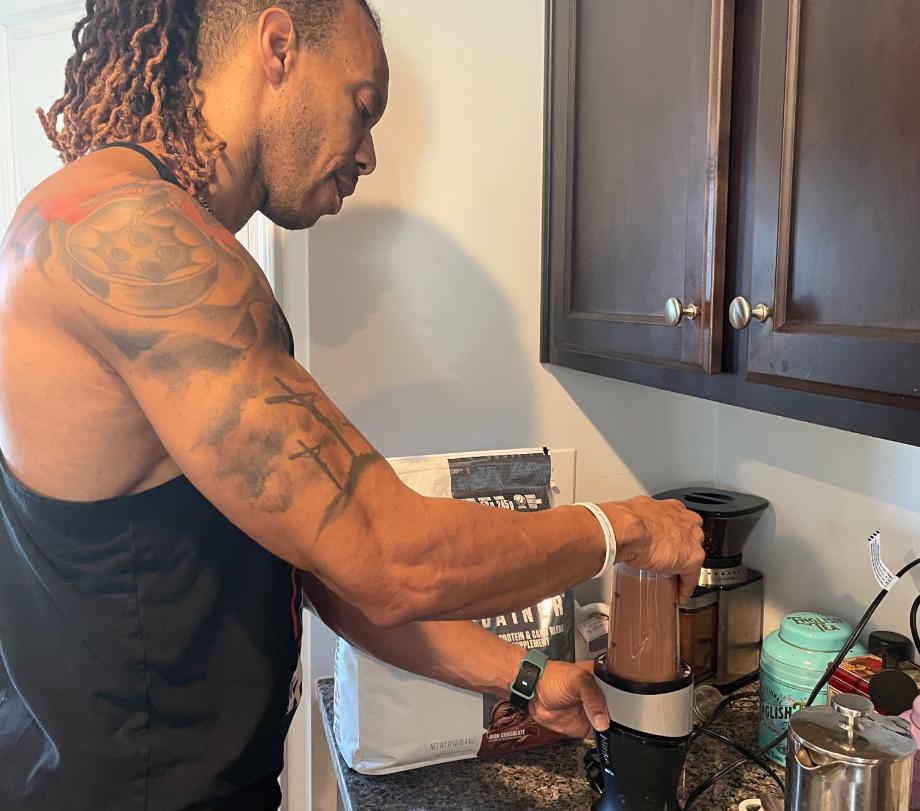We test and review fitness products based on an independent, multi-point methodology. If you use our links to purchase something, we may earn a commission. Read our disclosures.
It’s not your imagination that dietary protein has been thrust into the spotlight for its various health benefits. Whether you heard it from a fitness influencer, a friend who dropped a few pounds, or a health practitioner, it feels like everyone has boarded the high-protein diet train.
Getting enough protein is essential for overall wellness. Protein supplies you with amino acids that are used to maintain and repair virtually every tissue in your body, make hormones and neurotransmitters, support the immune system, and more. Increasing protein intake is essential for repairing and growing muscle, but it can also help you shed pounds.
As a registered dietitian, I personally use and recommend protein powder to get more protein in a day. So, are protein shakes good for weight loss if you’re struggling to eat enough protein? Learn the answer below, plus tips for choosing and using protein shakes for weight loss.
Editor’s Note and Medical Disclaimer: This article is intended for educational and informational purposes only. It is not intended as a substitute for medical advice. Weight loss programs are not recommended for people with a history of disordered eating. For health advice, contact a licensed healthcare provider. If you need help with disordered eating, contact NEDA.
Quick Answer: Are Protein Shakes Good for Weight Loss?
Yes, protein shakes can help you lose weight.
Shakes aren’t a quick fix or a replacement for whole foods, a balanced diet, or exercise, but they’re a quick and easy way to get extra protein in your day.
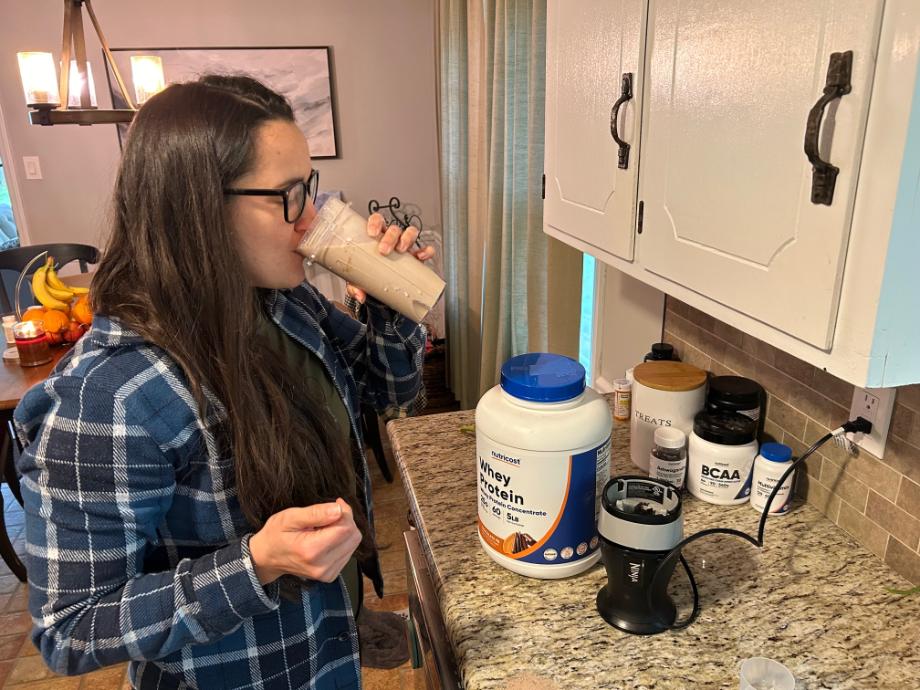
Eating more protein and spreading your protein intake across the day can regulate appetite, help you eat fewer calories, boost metabolism, and encourage fat burn.
What Is a Protein Shake?
A protein shake is a drink made with powdered protein that may or may not include other ingredients. Protein is the most predominant ingredient, but some protein shakes also include vitamins, minerals, and other extras.
A typical protein shake contains around 20 grams of protein, but will vary in calories, fat, and carbs depending on the type of protein it’s made with. There are tons of protein powders to choose from, so let’s review the basics.
Types Of Protein Powders
Whey protein powder is the most well-known type of protein powder. It also happens to be the most researched.
Whey protein is sourced from cow’s milk and is considered a high-quality, complete protein. It has been linked to more muscle mass and improved body composition when combined with resistance training. There are three types of whey protein, which differ in macronutrients.
Whey protein concentrate is widely available and affordable, but it contains more carbohydrate and lactose. If you’re sensitive to lactose, whey protein isolate may be the better choice. Isolate is filtered to remove more carbs and lactose and is more concentrated in protein. There’s also hydrolyzed whey protein, which is marketed as being fast-digesting.
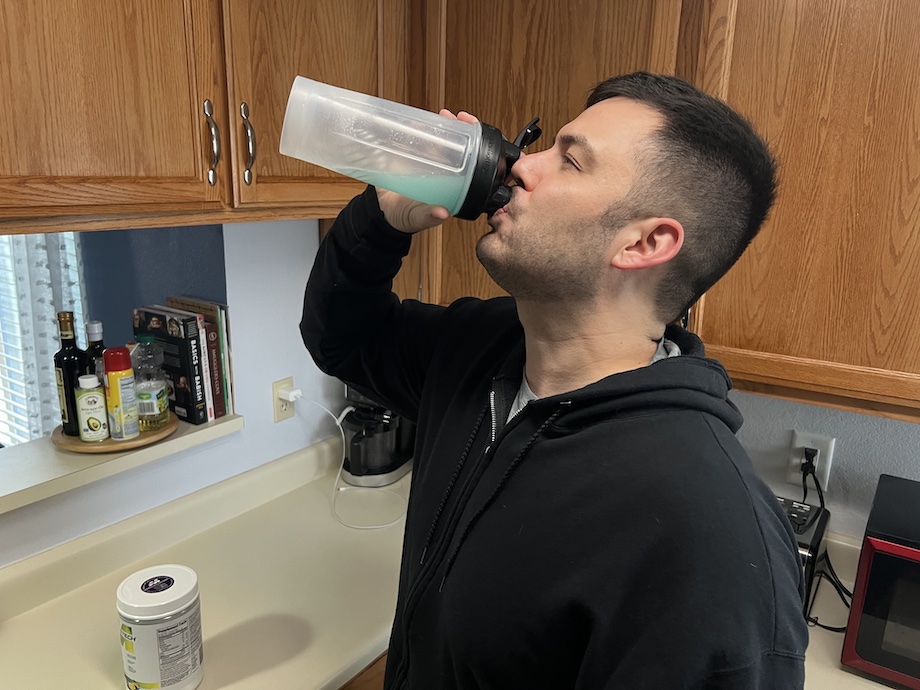
RELATED: Best Whey Protein
If whey isn’t an option for whatever reason, there are other animal-based protein powders besides whey, including:
- Casein protein, which is the other main protein found in dairy milk
- Egg white protein powder
- Beef protein powder
- Collagen peptides
There are also plant-based protein powders for vegetarians, vegans, and anyone who just prefers plant-based supplements. Compared to animal proteins, plant-based proteins are typically missing an essential amino acid (meaning they’re incomplete), so it’s common to find plant protein blends in vegan protein powders.
Popular plant-based proteins include:
- Pea protein
- Soy protein
- Brown rice protein
- Pumpkin seed protein
- Hemp protein
- Chia seed protein
Which Type of Protein Powder Is Best for Shakes?
We test protein powders by the dozen, so we’ve learned a thing or two when it comes to which protein powders make the best shakes. An A+ protein shake should be easy to mix, smooth in texture with no clumps, and taste great.
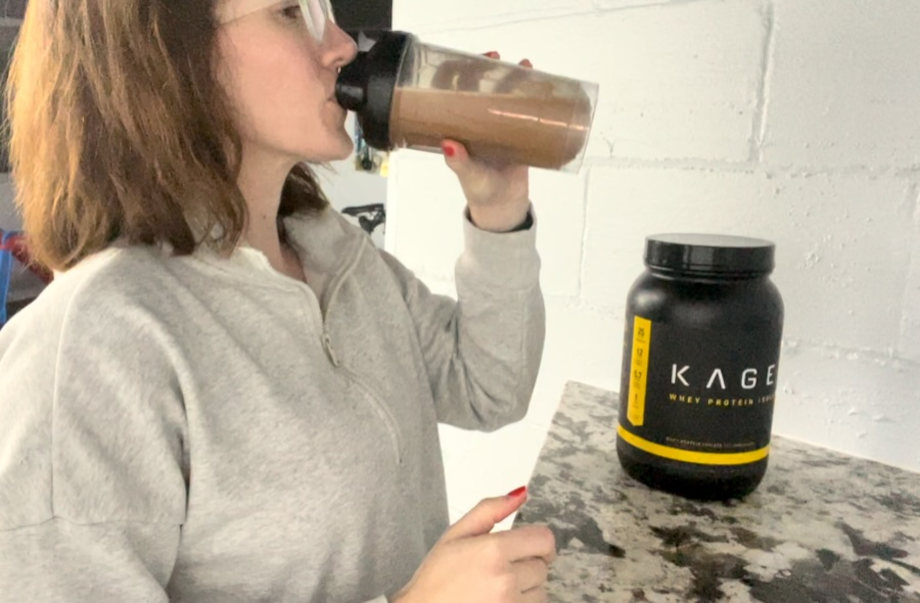
In our experience, whey concentrate and whey isolate tend to deliver the best results. Of course, you can make a protein shake with any protein powder you choose.
Tips for Choosing a Protein Powder
The best protein powder for you is one that fits your dietary needs and preferences. Once you’ve figured out the best type of protein for your needs, we recommend looking for a high-quality protein powder that’s third-party tested to ensure the protein contains what’s listed on the label.
RELATED: Understanding Protein Powder Labels
Here are more shopping tips:
- High-quality protein powders should contain minimal ingredients. That means the protein source should be listed as the first ingredient and the product shouldn’t have many additives or fillers.
- To support weight loss, pass on any protein powder that contains added sugars or oils, which add calories.
- The best protein powders for weight loss are high in protein and low in calories, fat, and carbohydrates. A good rule of thumb is choosing one with at least 20 grams of protein and less than 200 calories per serving.
- Many protein powders contain artificial flavoring and sweetener. While these products can taste good and still aid weight loss, we prefer natural ingredients, like stevia or monk fruit extract, whenever possible to support overall health.
Benefits of Protein Shakes for Weight Loss
Protein is well-documented as beneficial for weight loss. A 2021 systematic review1 of 37 studies looking at how protein intake affects body weight found that individuals who consume high-protein diets lose more weight and keep it off compared to those eating lower-protein diets or the standard American diet.
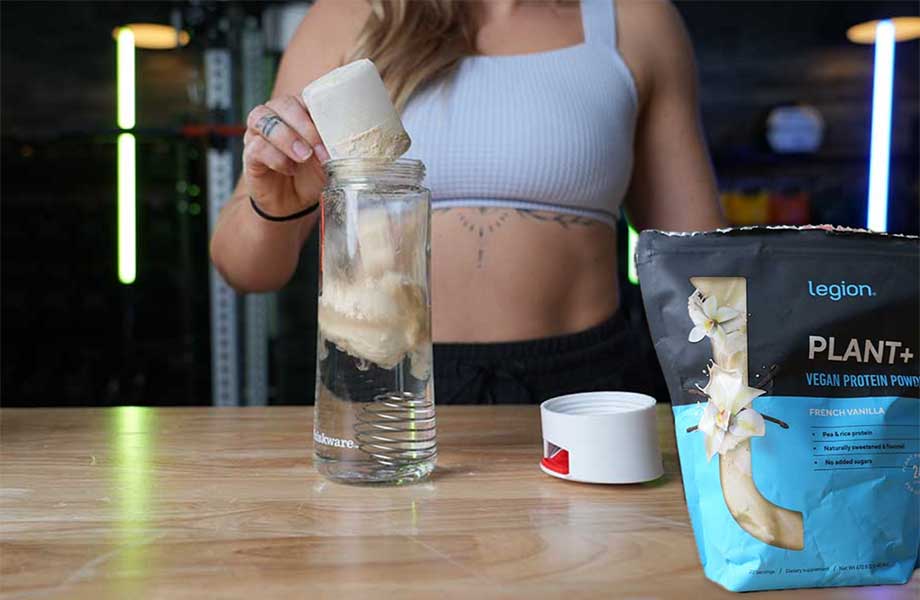
Since protein shakes are a good source of protein, it follows that they can help you lose weight. Here’s how:
Enhances Satiety
Protein is the most filling macronutrient because it takes your body longer to digest compared to carbohydrates and fat.
Including quality proteins at each meal and snack can help you feel satisfied for fewer calories. That means you’re less likely to feel hungry and experience cravings when you’re eating protein throughout the day.
Researchers have found high-protein diets2 increase hormones that regulate satiety and appetite. A protein shake is an excellent way to add protein to a meal or snack.
Supports Metabolism
In addition to curbing appetite, protein can also boost metabolism—aka the amount of energy your body uses in a day. Your body uses energy in the form of calories to digest protein. This is called the thermic effect of food3.
Although you shouldn’t expect weight loss miracles just from sipping a protein shake, every extra calorie burned helps you reach your goals.
Builds Muscle
Eating more protein, like protein shakes, can help you build muscle. Muscle tissue burns more energy than body fat and the more muscle you have, the higher your metabolic rate will be. You’ll see the biggest muscle gains if you’re combining a high-protein diet with resistance training4, like weightlifting.
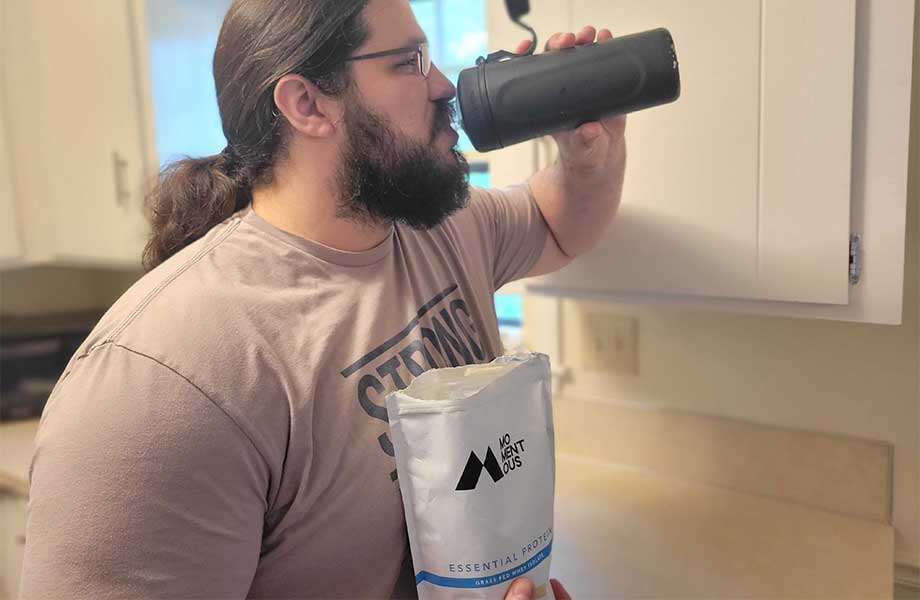
A 2016 study5 found participants who ate a calorie-controlled high-protein diet and engaged in resistance training gained more muscle and lost more body fat than the group eating a lower protein diet.
Protein shakes can also help your muscles recover after exercise and help you retain lean mass while shedding body fat.
Ease of Preparation
It’s not always easy to hit your protein goals or stick to your weight loss diet goals. A daily protein shake can help round out a meal that’s lacking in protein or be a convenient way to get a serving of protein when you’re on the go or too busy to cook.
Possible Side Effects of Protein Shakes for Weight Loss
There are a few risks to be aware of before you start sipping daily protein shakes. A healthcare provider can help you choose a protein powder that’s right for you.
Allergens
Some of the most popular protein powders are sourced from common food allergens, including milk, eggs, soy, and nuts.
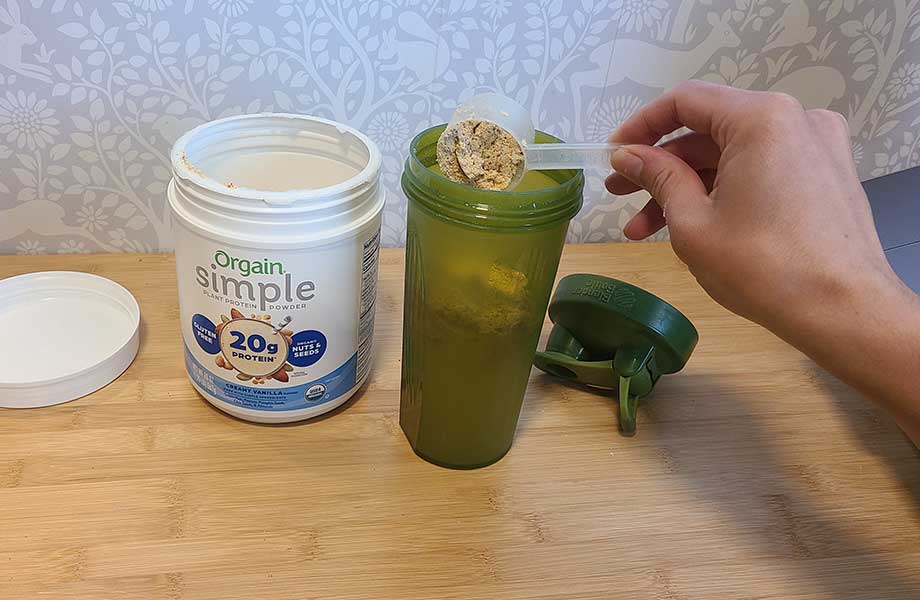
If you have food allergies or sensitivities, be sure to read ingredient labels to find a protein that is free from problematic foods. This is especially important in proteins that contain protein blends, such as plant-based protein powders.
Digestive Issues
Digestive issues, like an upset stomach, bloating, and gas, are the most common side effects from using protein powders. Individuals who are sensitive to lactose are at higher risk for digestive side effects when using a whey or casein protein.
Other ingredients that can cause tummy troubles include artificial sweeteners and sugar alcohols, such as erythritol. Choosing a protein powder with minimal, all-natural ingredients may cut down on the chance of indigestion. Since bio-individuality plays a role here, choosing brands that offer a money-back guarantee is a good idea in case you don’t tolerate a product.
Nutrient Displacement
To support weight loss, protein shakes should be used as a protein supplement to the total amount of protein in your diet. If you start replacing meals with protein shakes, you run the risk of displacing important nutrients, like healthy fats, fiber, vitamins, and minerals, in your diet.
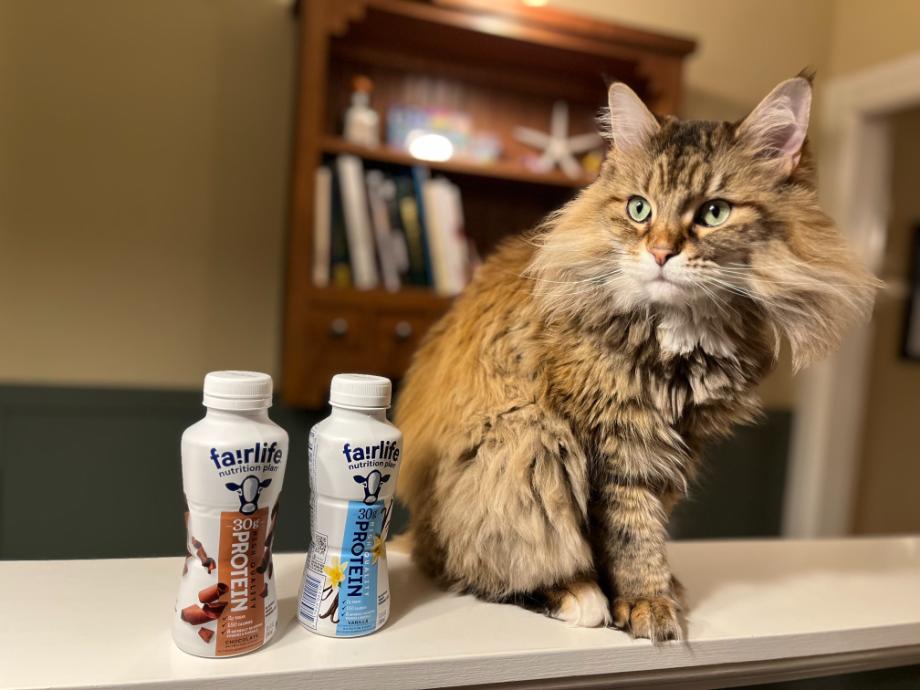
Protein shakes are also much lower in calories than a meal. Eating too few calories can wreck your metabolism and isn’t a sustainable way to drop pounds.
How To Use Protein Shakes for Weight Loss
Protein shakes are a great high-protein snack or post-workout meal to enhance muscle recovery. They can also be used as a meal replacement, but you’ll want to add other ingredients to make it a complete meal. Adding fresh or frozen fruit and veggies, nut butter, and/or seeds can add calories, fiber, healthy fats, vitamins, and minerals to a protein shake.
RELATED: Protein Snack Ideas
Whether you’re making a snack or meal, stick to the recommended serving size, which is typically one included scoop. There isn’t evidence that drinking a protein shake at a certain time of day is better than others.
If you don’t have time for breakfast or tend to eat less protein early in the day, a protein shake can help balance protein intake in the morning. Increasing protein at the start of the day can help with satiety all day long.
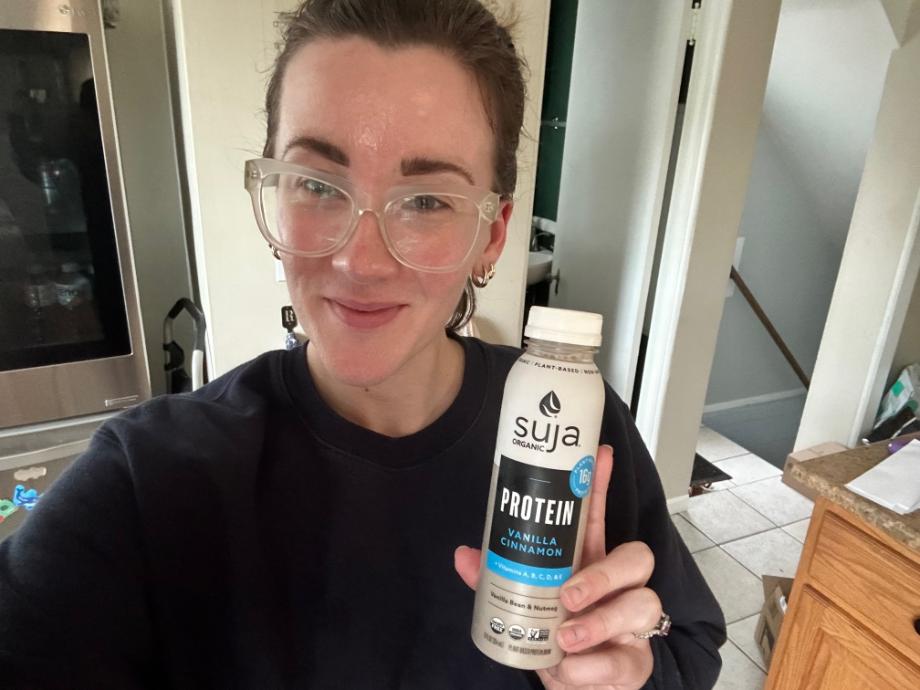
If you’re already eating a large, protein-packed breakfast, a protein shake as a snack, after exercise, or before bed can help you hit your daily protein goals for weight loss. You can also add a shake to a meal as a source of protein.
Are Protein Shakes Good for Weight Loss? Final Thoughts
Out of all three macronutrients, protein is king if you’re trying to lose weight. Eating more protein helps you feel full, boosts metabolism, and can help you maintain or increase lean muscle mass while dropping fat.
Including a variety of high protein foods in your diet is the best way to support weight loss and overall wellness, but hitting daily protein goals can be tough without supplemental protein. Protein shakes are an easy way to increase protein intake and reach your body composition goals.
- Protein shakes are a convenient way to add protein to your meal plan, whether as a snack or blended with other ingredients for a meal replacement.
- You can make your own protein shakes with a protein powder or purchase ready-to-drink shakes.
- There is a protein powder to match every type of diet, including animal and plant-based options.
- To support weight loss, look for protein powders with at least 20 grams of protein and under 200 calories per serving.
Are Protein Shakes Good For Weight Loss? FAQs
Should you drink protein shakes when trying to lose weight?
You can certainly lose weight without protein shakes, but it can be hard to hit daily protein goals without protein powder or a ready-to-drink protein shake. Protein shakes may help you lose weight by enhancing satiety and supporting muscle growth, but you can get the same benefit from protein foods, like lean meat, poultry, seafood, dairy, and legumes, so long as you’re in an overall calorie deficit.
What protein shake is best for weight loss?
Any protein shake that contains little to no fat, carbs, or added sugar can support weight loss. They should contain 20 to 25 grams of protein and somewhere between 150 to 200 calories per serving.
The highest quality protein shakes don’t contain artificial ingredients or long lists of additives and are third-party tested for safety. As for the type of protein, the best one is the one you tolerate and will actually drink.
Does protein burn fat without exercise?
Eating more protein doesn’t directly burn body fat. Including more lean proteins at meals and snacks can help you feel fuller for fewer calories, which may help you eat less overall to support weight loss. The best formula for fat loss is to eat a higher protein diet, while maintaining a calorie deficit and exercising.
Is it better to drink protein shakes in the morning or at night for weight loss?
There’s no evidence that the timing of your protein shake impacts weight loss. The most important thing for weight loss is consistently increasing protein intake throughout the day, which protein shakes can help with.
These statements have not been evaluated by the Food and Drug Administration. This product is not intended to diagnose, treat, cure, or prevent any diseases.
References
- Hansen, T. T., Astrup, A., & Sjödin, A. (2021). Are Dietary Proteins the Key to Successful Body Weight Management? A Systematic Review and Meta-Analysis of Studies Assessing Body Weight Outcomes after Interventions with Increased Dietary Protein. Nutrients, 13(9), 3193. https://doi.org/10.3390/nu13093193
- Moon, J., & Koh, G. (2020). Clinical Evidence and Mechanisms of High-Protein Diet-Induced Weight Loss. Journal of Obesity & Metabolic Syndrome, 29(3), 166–173. https://doi.org/10.7570/jomes20028
- Drummen, M., Tischmann, L., Gatta-Cherifi, B., Fogelholm, M., Raben, A., Adam, T. C., & Westerterp-Plantenga, M. S. (2020). High Compared with Moderate Protein Intake Reduces Adaptive Thermogenesis and Induces a Negative Energy Balance during Long-term Weight-Loss Maintenance in Participants with Prediabetes in the Postobese State: A PREVIEW Study. The Journal of Nutrition, 150(3), 458–463. https://doi.org/10.1093/jn/nxz281
- Stokes, T., Hector, A. J., Morton, R. W., McGlory, C., & Phillips, S. M. (2018). Recent Perspectives Regarding the Role of Dietary Protein for the Promotion of Muscle Hypertrophy with Resistance Exercise Training. Nutrients, 10(2), 180. https://doi.org/10.3390/nu10020180
- Longland, T. M., Oikawa, S. Y., Mitchell, C. J., Devries, M. C., & Phillips, S. M. (2016). Higher compared with lower dietary protein during an energy deficit combined with intense exercise promotes greater lean mass gain and fat mass loss: a randomized trial. The American Journal of Clinical Nutrition, 103(3), 738–746. https://doi.org/10.3945/ajcn.115.119339
Further reading

1st Phorm is a big name in the fitness nutrition industry, but how do its products stack up? Find out in this 1st Phorm protein review. Read more

Stronger core muscles, greater mobility, and better sex? The pelvic tilt exercise boasts these benefits and more! Check out our expert guide right here! Read more

The REP Omni Rackis a flat-footed power rack version of the almighty PR-5000 V2. Its ability to sit on a home gym floor unbolted, yet still sturdy while also offering the potential to go from a half rack to full rack is unique. We recommend the Omni Rack just as we recommend the PR-5000. However, the two squat racks are extremely similar–for most people, we feel the PR-5000 V2 is a better option for reasons explained in our review. Read more

Get your heart rate up, improve your cardio fitness, and sweat through these three rowing interval workouts. Read more

